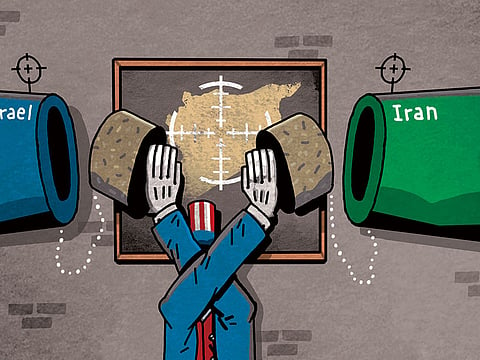Only the US can prevent more Israel-Iran clashes in Syria
The only thing that will make Tehran roll back its engagement in the region is the sense that it is fighting a losing battle

Israel’s retaliatory attack on Iranian military targets inside Syria represents the biggest direct confrontation between the two countries in their history. It came after rockets were launched from Iranian bases in Syria towards the Golan Heights. This escalation has caused widespread concern that war might be imminent between Israel and Iran.
But neither wishes to engage in an all-out war with the other. Iran’s Golan Heights rocket launch was the product of the growing pressure it faces in the Syrian conflict. Unless the United States steps in with a plan for Syria, Israel and Iran will continue to clash there.
Iran regards its presence in Syria as crucial for its influence in the Levant. Syria is the thoroughfare by which Iran sends weapons to Hezbollah in Lebanon. Iranian influence in Syria has grown exponentially since 2011 as the Syrian regime of Bashar Al Assad has become increasingly reliant on Iran’s help for its survival.
But the proliferation of Iranian-backed troops in Syria, whether in the form of the Islamic Revolutionary Guard Corps or proxies such as Hezbollah, has been making Israel anxious about its own security. Israel has consistently targeted Iranian and Hezbollah fighters whenever their activities in southern Syria edged too close to its border.
The pressure on Iran has increased, now that it is almost surrounded geographically in Syria. While the south falls under Israeli and Jordanian oversight, Turkey is de facto controller of north-western Syria, while the US-supported Syrian Defence Forces are in the north-east.
Iran was the most influential foreign country to support the Al Assad regime until Russia stepped up its efforts to help Al Assad. This is an uncomfortable dynamic for Iran, because Russia wants to have the upper hand; it sees Iran mainly as a convenient source of ground troops that complement the Russian air force in attacks against Syrian rebels.
Russia’s good relationship with Israel also plays a role in the former’s efforts to keep Iran in check. On a number of occasions, Russia has fed intelligence about Iranian positions in Syria to Israel, who proceeded to attack these targets. The latest such incident took place in late April, when Israeli planes attacked Base 47 in Syria. Iran publicly admitted to the death of only 18 soldiers there, but Syrian sources say the number was closer to 200.
Some analysts have linked the Golan Heights rocket attack to United States President Donald Trump’s announcement that the United States is withdrawing from the Joint Comprehensive Plan of Action (JCPOA) nuclear agreement with Iran.
Brewing battle
However, the JCPOA withdrawal was merely convenient timing. Before the announcement, the appointment of Iran hawks such as US Secretary of State Mike Pompeo and National Security Adviser John Bolton, signalled an elevation in the importance of the Iranian file. Pulling out of the JCPOA can be seen as the moment when the US signalled to Iran that the gloves had come off, but the battle was already brewing.
With this American pressure, and the situation with Russia becoming increasingly complicated, Iran had to save face. It did not launch the kind of attack on Israel that would have led to full-on war, but it provoked Israel enough to retaliate. If Iran cannot ease the pressure on itself, then its tactic is to inflict pain on its opponents. But since neither Iran nor Israel is interested in engaging in war with one another, they both need to deflect aggression away from their national spaces. Syria provides an arena in which they can fight directly yet with minimal damage. We can therefore expect further escalation between Iran and Israel in Syria.
As long as Iran feels that it has the ability to retain its influence in the Levant, it will continue to meddle in Lebanon and Syria and provoke Israel. The only thing that would cause Iran to roll back its engagement would be the sense that it was fighting a losing battle. If the US presents Russia with a comprehensive plan to end the Syrian conflict, this would send such a message to Iran.
The options for Iran would then be either to fight bitterly in the hope of a repeat of 2006, when Israel attacked Hezbollah in Lebanon but failed to eradicate it, or agree to a trade-off with the US and Israel. With Iraq being of far greater importance to Iran than the Levant, both because of its geographical proximity and religious significance for the Shiite community, Iran will not want to see Iraq destabilised. It therefore might accept a compromise that retains stability in Iraq in return for handing Syria over to Russia. But Iran will not reach this compromise unless it feels it has no other choice.
It remains to be seen which path Iran will take, but Israel will not wait patiently for it to make this decision.
— Guardian News & Media Ltd
Lina Khatib is the head of the Middle East and North Africa Programme at Chatham House, where she leads the project Syria From Within.
Sign up for the Daily Briefing
Get the latest news and updates straight to your inbox


